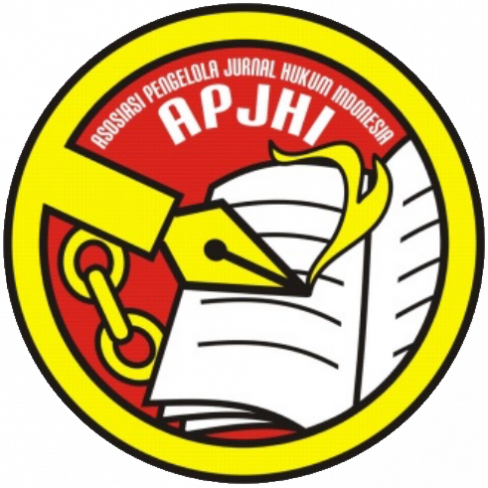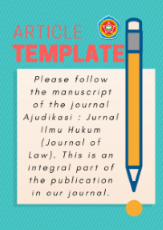Legal Protection for Micro, Small, and Medium Enterprises in the Perspective of Job Creation Act
DOI:
https://doi.org/10.30656/ajudikasi.v8i1.8810Keywords:
Job Creation Law, Legal Protection, MSME CriteriaAbstract
The Job Creation Law, or often referred to as the Omnibus Law, has become a hot topic of debate in the community. On one hand, there are those who support this law on the grounds that it can accelerate economic growth and create new jobs. History shows that MSMEs have tremendous resilience in the face of economic crises. When the economic crisis hit in 1998 and 2008, MSMEs were relatively able to survive compared to large companies. Despite their great potential, MSMEs in Indonesia face various challenges. One of the main challenges is limited access to financing. Many MSMEs struggle to obtain sufficient working capital to expand their businesses. In addition, the low level of education and skills of the workforce is also an obstacle in improving the productivity and competitiveness of MSMEs. The research process using literature studies began with a descriptive qualitative research type. Legal protection for MSMEs is currently better regulated through the Job Creation Law and Government Regulation Number 7 of 2021. Both regulations pay special attention to financing and legal assistance for MSMEs, including legal counseling, legal consultation, mediation, and out-of-court assistance
Downloads
References
Carma, Gde Oka Dharmawan. “Pelaksanaan Perlindungan Hukum Terhadap Korban Tindak Pidana Terorisme Di Bali.†UAJY, 2018.
Harahap, Isnaini, Zuhrinal M Nawawi, and Angga Syahputra. “SIGNIFIKANSI PERANANAN UMKM DALAM PEMBANGUNAN EKONOMI DI KOTA MEDAN DALAM PERSPEKTIF SYARIAH.†Jurnal Tabarru’: Islamic Banking and Finance 6, no. 2 (2023): 718–28.
Komara, Beni Dwi, Heri Cahyo Bagus Setiawan, and Aries Kurniawan. “Jalan Terjal UMKM Dan Pedagang Kecil Bertahan Di Tengah Pandemi Covid-19 Dan Ancaman Krisis Ekonomi Global.†Jurnal Manajemen Bisnis 17, no. 3 (2020): 342–59.
Kristiyanti, Mariana. “Peran Strategis Usaha Kecil Menengah (UKM) Dalam Pembangunan Nasional.†Majalah Ilmiah Informatika 3, no. 1 (2012): 63–89.
LAIA, MERLINDA ANASTASYA. “Perlindungan Hukum Terhadap Anak Sebagai Korban Tindak Pidana Kekerasaan Seksual Yang Dilakukan Oleh Anak Dibawah Umur (Studi Putusan Nomor: 10. Pid. Sus-Anak. 2020. PN. Kdi),†2021.
Marlinda, Alin, and Lilis Karnita Soleha. “Implementasi Strategi Inovasi Dalam Pengembangan Usaha Mikro Kecil Dan Menengah (UMKM) Di Desa Pinangsari, Kabupaten Subang.†AL-MIKRAJ Jurnal Studi Islam Dan Humaniora (E-ISSN 2745-4584) 4, no. 02 (2024): 579–91.
Maryanto, Maryanto, Munsharif Abdul Chalim, and Lathifah Hanim. “Upaya Pemerintah Dalam Membantu Pelaku Usaha Umkm Yang Terdampak Pandemi Covid-19.†Audi Et AP: Jurnal Penelitian Hukum 1, no. 01 (2022): 1–11.
Moertiono, R Juli. “Perjanjian Kredit Pemilikan Rumah Dalam Perspektif Teori Perlindungan Hukum.†All Fields of Science Journal Liaison Academia and Sosiety 1, no. 3 (2021): 252–62.
Novitasari, Anindita Trinura. Strategi UMKM Bertahan Di Masa Pandemi. Deepublish, 2022.
Sastradinata, B Lena Nuryanti. Strategi UMKM Dan Bisnis Kreatif. Bumi Aksara, 2024.
Surani, Dewi. “Studi Literatur: Peran Teknolog Pendidikan Dalam Pendidikan 4.0.†In Prosiding Seminar Nasional Pendidikan FKIP, 2:456–69, 2019.
Zia, Halida. “Pengaturan Pengembangan UMKM Di Indonesia.†Rio Law Jurnal 1, no. 1 (2020).
Downloads
Published
Issue
Section
License
Authors who publish with this journal agree to the following terms:
Authors retain copyright and grant the journal right of first publication with the work simultaneously licensed under a Creative Commons Attribution License that allows others to share the work with an acknowledgment of the work's authorship and initial publication in this journal.
Authors can enter into separate, additional contractual arrangements for the non-exclusive distribution of the journal's published version of the work (e.g., post it to an institutional repository or publish it in a book) with an acknowledgment of its initial publication in this journal.
Authors are permitted and encouraged to post their work online (e.g., in institutional repositories or on their website) before and during the submission process, as it can lead to productive exchanges and earlier and greater citation of published work.
All articles in Ajudikasi : Jurnal Ilmu Hukum can be disseminated provided they include the identity of the article and the source of the article (Ajudikasi : Jurnal Ilmu Hukum). The publisher is not responsible for the contents of the article. The content of the article is the sole responsibility of the author
Ajudikasi : Jurnal Ilmu Hukum is lincensed under a Creative Commons Attribution-ShareAlike 4.0 International License.









1.png)
.png)
.png)





.png)
.png)
.png)
.png)





.png)







